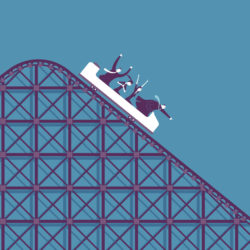‘Digitalization success is all about the mindset’

Where should you board the digitalization roller coaster? Gartner’s hype cycle shows a steep climb followed by a drop to the trough of disillusionment. How can you keep sufficient momentum going to emerge from the valley of disappointments and ultimately reap the benefits of productivity? During Gartner’s supply chain conference in London in September 2018, it became clear that leaders need to be skilled in exploration, adaptation and scaling up.
According to Marc Engel, Chief Supply Chain Officer at Unilever, it all revolves around the shift from ‘acting digital’ to ‘being digital’. “We won’t make it unless we change the human capital in companies.” Engel referred to a quote by futurologist Alvin Toffler to illustrate what keeps him awake at night: ‘The illiterate of the 21st century will not be those who cannot read and write, but those who cannot learn, unlearn and relearn.’ “The model of 15 years of baggage is outdated. Learning is no longer the same as it was 20 years ago, but online instead.”
Engel noted that the fast-moving consumer goods (FMCG) world has completely changed: “Our business used to be based on three pillars: mass communication with lots of TV advertising, mass distribution and mass production. Watching TV has gone out of fashion over the past five years, which has had major consequences for our marketing. Amazon, Alibaba and JD all have bigger distribution networks than the FMCG brands. And it’s no longer an advantage to have your own production facilities.”
Digitalization means being able to handle huge volumes of data. “The acquisition of the Dollar Shave Club suddenly gave us more consumers than existing customers in our ERP system. That’s why we need to make the master data management process sexy rather than something only for older employees. We have to break data myths and taboos.”
Success depends on people’s abilities to learn and a digital quotient. “In the past, most leaders were focused on a different game. Personally, I want to make a real difference. That’s why, every Friday, I make a note of how I’ve made a difference that week.”
Fearless card games
In the eyes of Daniel Helmig, who is responsible for ABB’s supply chains worldwide, it is the employee mindset that matters most in major supply chain transformations: “We can do anything if we put our minds to it.” He and his team have proved just that by rolling out three global projects in the space of a thousand days: the centralization of purchasing in five locations around the world, the implementation of a worldwide transport management system (TMS), and the setting up of three centres of expertise.
“Implementing a worldwide TMS calls for commitment”, stated Helmig. “You need to look your colleague in the eye and say: ‘We’ll do this together’. But in hindsight we should have chosen a bigger software supplier.”
To get all the managers involved in the three major projects pulling in the right direction, Helmig brought everyone together in Estonia. “We split up into groups and played the card game called ‘quartets’ with product categories. That eliminated any fear they had. Gamification really works. It helps something to click in the brain.”










